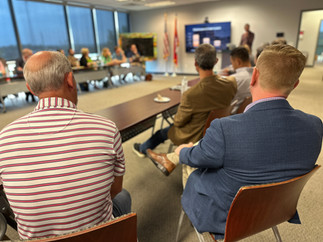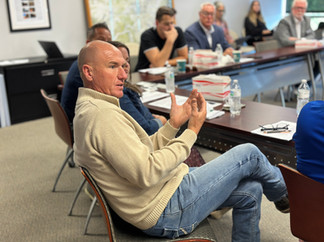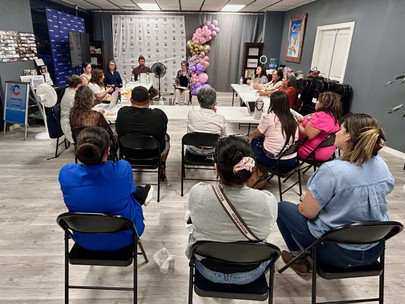Community Voices Resonate as ‘Growing Home’ Roadshow Continues
- Growing Home NWA Project Team
- Sep 22, 2025
- 5 min read
Diverse groups across Northwest Arkansas share priorities and concerns.

The Growing Home roadshow continued Sept. 19-20, with a full slate of conversations on Northwest Arkansas’ future. Each stop brought new perspectives, adding depth to the region’s growth story. Updates from the road will keep sharing insights as the tour progresses.
Need to get caught up? Read about the first four stops here.
Stop Five: Homebuilding Industry
Thursday morning opened with a packed session of real estate professionals, who outlined the hurdles in meeting Northwest Arkansas’ housing needs. The discussion echoed earlier themes, while adding the perspective of those tasked with turning plans into projects.
Participants pointed to complicated zoning, codes and approvals that slow progress, calling for simpler processes, clearer communication and better public education to support a wider range of housing options. They expressed frustration at the slow emergence of "missing middle" options such as cottages, townhomes and small apartments despite demand. Rising land costs, financing structures and regulatory hurdles were cited as barriers.
Some raised concerns that recent legislation weakened local control, while others saw potential in public-private partnerships and regional tools to unlock underutilized city- and university-owned land.
Despite frustrations, participants agreed that overcoming resistance to gentle density will require education that connects to daily life: affordability, access to the outdoors and overall quality of life are what is at stake.
Stop Six: More Elected Officials
The roadshow’s next stop gathered elected officials from southern Washington County, with Fayetteville as the hub. From Lincoln in the west to Elkins in the east, these communities share both the opportunities and struggles of being near a growing university town while retaining small-town identities.
Much of the discussion centered on development at city edges, where municipalities have little control but still bear the costs of traffic, emergency response and infrastructure. Leaders noted that recent legislation has further limited their ability to manage growth outside city borders, leaving long-term service costs tied to low-yield development.
Housing affordability and community identity were recurring themes. Leaders described the challenges of balancing growth with public resistance, especially around affordable housing or denser development. Past projects that faced years of pushback underscored the need to build trust through communication and education.
Green space preservation was another concern. Several warned that unchecked sprawl could erode the outdoor assets that draw people to the region. Others noted a jobs-housing mismatch that pushes residents farther out, leading to longer commutes.
Transportation and transit also surfaced, with agreement that stronger connections between Fayetteville, Bentonville and everywhere in between will be essential as the region grows. Public support for transit is growing, development patterns will need to adapt to make systems viable.
The conversation reflected both frustration and resolve. For these leaders, growth shows up in strained budgets, crowded schools and rising costs. They see collaboration, clearer communication and context-sensitive planning as key to preserving community character while meeting future needs.
Stop Seven: Marshallese Community
A special roadshow session brought together members of the Marshallese community, one of Northwest Arkansas’ largest immigrant groups. Participants spoke candidly about what they value and the challenges they face as the region grows.
Family, neighbors and walkable access to schools were highlighted as priorities. But much of the discussion focused on barriers to stability and opportunity. Many described difficulties navigating the U.S. financial system, where credit scores, application fees and unfamiliar banking practices make housing and business ownership difficult. With most families renting, concerns about rising rents, weak tenant protections and overcrowding were common.
Transportation is another need. Public transit often does not reach the apartment complexes where many Marshallese families live, leaving elders without reliable ways to reach medical care or services. Jobs with long commutes add pressure to already strained household budgets.
Other challenges included limited access to culturally competent health care, underrepresentation in schools and local government, and lack of Marshallese-speaking liaisons in institutions. Community leaders called for more educational resources, translation services and support for churches and cultural organizations that anchor community life.
While many of these issues fall outside the scope of regional land use planning, participants emphasized that being included in the conversation matters. Their perspectives highlight the importance of ensuring that all communities feel heard and supported as Northwest Arkansas grows.

Stop Eight: Hispanic Community
Two sessions with members of the Hispanic community affirmed what residents value in Northwest Arkansas while candidly addressing challenges as the region grows.
Participants praised the area’s green landscapes, parks, trails and welcoming culture, noting the importance of preserving safety, tranquility and family-friendly environments as cities like Springdale and Rogers become more cosmopolitan.
Housing was the most pressing concern. Rising rents, displacement and lack of affordable options weigh heavily on families, seniors and service workers. Leaders also pointed to the strain on nonprofits and Latino-led organizations that bridge families and schools but lack stable funding.
Infrastructure and transportation were recurring themes. Residents cited unsafe or missing sidewalks, poor lighting, potholes, long and unreliable bus routes, and limited transit service to where people live and work. Some expressed frustration that decades of investment in transit have brought little visible change.
Other concerns included overcrowded schools, long bus rides, and safety issues in public spaces and on trails. Fear tied to immigration enforcement was also noted, discouraging some families from gathering in parks.
Across all discussions, participants emphasized inclusion and representation, calling for growth strategies that protect affordability, improve accessibility and advance equity while preserving the qualities that make Northwest Arkansas a welcoming place to call home.
Stop Nine: Fayetteville Farmers Market
Saturday morning brought shifting weather but steady engagement as the Growing Home team set up at the Fayetteville Farmers Market. Over the course of 486 one-to-one interactions, residents shared their thoughts on growth while picking up flyers and scanning survey QR codes.
Public transportation drew strong support, with calls for more routes and more frequent service. Concerns about traffic, rising housing costs and the overall cost of living were consistent themes. Some criticized sprawling subdivisions pushing into the county and raised stormwater issues, noting runoff from new developments often creates flooding that crosses city lines.
The crowd reflected the market’s mix of locals and visitors across all ages. Several participants pointed to the region’s growing cosmopolitan character, crediting newcomers with adding diversity and energy.
Alongside casual exchanges were targeted conversations with developers, Strong Towns advocates and transportation activists. Together, these interactions underscored both the enthusiasm and the concerns shaping how people in Northwest Arkansas experience growth.
Next Steps
As the roadshow continues, the voices we are hearing from real estate professionals, community leaders and neighbors across the region highlight both the complexity and urgency of growth. Each story behind the numbers reflects real challenges and aspirations, underscoring what is at stake for Northwest Arkansas.
Stay engaged by joining us at upcoming events, and sharing your perspective through the community survey. Together, these conversations will help shape a future that reflects the needs and values of all who call Northwest Arkansas home.






















































